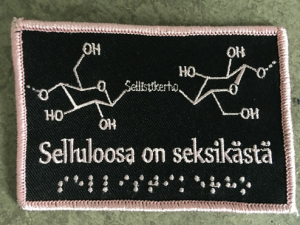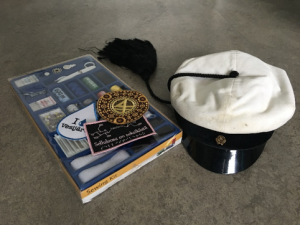I’m now enrolled in the last few courses that I need for completing my master’s degree in engineering at Aalto University. Right now, I’ve notched up 253 credits out of the 300 required. The remainder will be covered by 17 credits’ worth of lectures and my master’s thesis. I think it’s time to look back on the past five years and take stock of what I’ve learned.
1. Field-specific knowledge

Of course, the main thing you are supposed to gain at university level is in-depth knowledge of a specific topic. My university transcript includes 20 credits of chemistry and 20 credits of mathematics. With each credit representing 27 hours of hard work, I have spent 540 hours studying chemistry and mathematics, each. That translates to 22 full days spent on each of the two subjects. I can’t say that I remember much about these basic courses, but I’m sure those 44 days of 24/7 studying could have been put to worse use.
In addition, some of the classes were aimed at providing me with specialist knowledge in my relatively narrow field, including studies in bioproduct technology. This 40-credit course plan included classes on natural-fiber-based products and forest-industry biorefineries. In addition to becoming steeped in engineering-related knowledge, I’ve learned to translate terms from the study programs out of marketing or branding lingo over the course of my studies. With the assistance of the Aalto–Finnish–Aalto dictionary now readily accessible on my internal bookshelf, I can give these classes their plain-language names:
Natural-Fiber-based Products = Paper Products and Sawn Timber
Forest Biorefineries = Pulp Factories
While learning this lingo, students also pick up the basics of marketing.
2. Broad expertise
Gaining broad-based expertise on topics outside your immediate field of study is an integral part of university learning. What this expertise covers depends on the individual student’s choices for optional classes (the extent of these varies, and they come to around 20 credits in my case) and minors (about 40 study credits for mine). I have expanded my expertise by signing up for a study program in production technology (18 credits), which became my bachelor’s-level minor; as an exchange student at the University of Limerick, in Ireland; and by taking part in Aalto University’s entrepreneurship program, the Aalto Ventures Program (for 22 credits), which led to the minor subject for my master’s studies. In addition, my chosen major, environmental engineering, covers such a wide range of topics that, rather than representing a study program in a specific field, it is designed to provide students with an extensive knowledge base. In pursuing this major, I have completed classes with topics ranging from entrepreneurship in the bioeconomy and industrial symbiosis field to environmental protection and problems faced by developing countries. I have learned a bit, but I still don’t feel that I have in-depth knowledge in my specialist field yet. But there’s still time: I have yet to complete my thesis.
3. Reaching our goals and sticking to schedule
In high school, prioritizing goals and deadlines wasn’t a problem, since everything you were expected to master was found between the covers of a single book. But this learning method, comprising ready-made packages of information, was undermined at college, particularly by courses that involve project work. To pass the course, you have to set schedules for yourself and abandon the textbook in favor of interaction with the surrounding world.
I feel that these project-based courses gave me the most, and I enthusiastically recommend them to everyone. The easiest way to rack up the required amount of optional studies is to attend lectures, but I can assure you that in this case challenging yourself instead really pays off. Well, as long as you’re on your toes at the first course meeting and pick a motivated team.
4. Developing your thinking skills

For schoolchildren, each question often has only one correct answer. When you wade into the deep waters of college, though, you soon realize that there are more shades of gray in the real world than even those erotic novels by E. L. James led you to believe. In addition to this constant questioning, your cognitive abilities are developed via mathematical exercises designed to teach you to think for yourself. Not that I can say that solving differential equations created any new connections in my brain that I would have noticed on a concrete level. But who am I to argue with the lecturer on this one…?
Personally, I think it is my optional studies, which include 11 credits’ worth of lectures by philosopher Esa Saarinen, that have had the biggest impact on my thinking. His course “Philosophy and Systems Thinking” can be found on YouTube under that name if you are interested in finding out more. In my blog piece on how to become a better summer employee, published last summer, I touched on Saarinen’s ideas and thoughts.
He is a divisive figure among students. Some think he’s brilliant, while others dismiss his lectures as gobbledygook. I recommend that you keep an open mind if possible and decide for yourself by listening to those talks on YouTube or – even better – attending his lectures, which are open to everyone, in Otaniemi.
5. Life
“College is great because you’re effectively an unemployed alcoholic but your parents are really proud of you.”
– an Internet meme
Five years is plenty of time to grow as a human being. Especially when this time includes moving away from home, the joys of shared living, and new social circles – with new friends and a new city. All this contributed to the outstanding learning curve that my university studies have provided me with. Over the past five years, Espoo’s Otaniemi has gradually begun to feel like home, but the time to embark on a career is rapidly approaching. So I plan to make the most of my last few months in this lively student environment. College studies might end, but learning never does.
Your Super-Techie
Paavo Vallas

